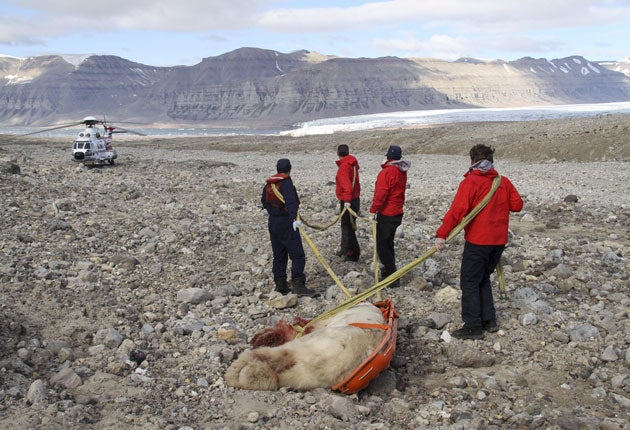Polar bear kills British teenager on remote Norwegian island

An arctic expedition by a group of British teenagers turned to tragedy yesterday when a polar bear tore through their camp, mauling one boy to death and seriously injuring four others.
The early morning attack on the remote Norwegian archipelago of Svalbard took place near the Von Postbreen glacier, a wall of ice on the western side of the main island that is popular with tourists and scientists.
The group were part of an 80-strong expedition of teenagers and young adults from the British Schools Exploration Society, a Kensington-based charity that specialises in sending youths on demanding challenges.
Every year they organise five-week trips to Svalbard where teenagers help conduct experiments for scientific researchers. The students are expected to raise their own funds to cover the £3,000 costs though some grants are issued.
Last night Horatio Chapple, a 17-year-old Etonian who planned to study medicine at university, was named as the boy who died in the attack. Those injured were team leaders Michael Reid and Andrew Ruck – both of whom are thought to be in their late twenties – as well as two teenagers, 16-year-old Patrick Flinders from Jersey and Scott Bennell-Smith.
Only 10 days earlier Marcus Wright, one of the expedition members, had blogged about how excited they were to see two polar bears a day after arriving in the nearby town of Longyearbyen. "I think we must have all dreamed of polar bears because the next day were eagerly waiting for the ice floes to break up so we could move on to base camp," he wrote.
"There was a p.bear sighting across the fjord about a mile away. We encountered another p. bear floating on the ice, this time we were lucky enough to borrow a kind Norwegian guide's telescope to see it properly."
Survivors of the attack were taken by helicopter to Longyearbyen and later flown to the Norwegian mainland for further treatment. They were described as suffering moderate to severe injuries including head trauma. "We got a call via satellite phone from a British group of campers that there had been a polar bear attack and that one person was dead and that others were injured and they needed assistance," said Liv Asta Odegaard, spokeswoman for the Governor of Svalbard. "There are no roads in the area so we scrambled a helicopter."
Flags on Svalbard were already at half-mast in memory of Johannes Buoe, 14, the second-youngest victim of last month's massacre at Utoeya by Anders Breivik.
Although maulings by polar bears are not unusual on Svalbard, fatalities are rare. According to the Svalbard Tourism Board, only four people have been killed in polar bear attacks there since 1971.
But locals rarely leave settlements without a high-powered rifle and tourists who choose to camp are expected to be trained in firearms and how to deploy tripwires around their tents which create a loud noise or flash to keep bears away.
It is not known whether tripwires had been placed around the group's camp on Thursday night, or if they had worked properly.
The charity's expedition blog page was unavailable yesterday afternoon but cached versions showed that many of the team members had been taught how to use guns and bear traps.
Norwegian officials confirmed that the bear had been shot by the campers, but some questioned how the animal had been able to maul so many people before it was subdued.
"It's very rare to have a death and so many injured," Ilona Wisniewska from the Svalbard tourism board told The Independent. "It's not clear how the bear was able to attack so many people before it was shot.
"Normally you would only expect one or two people injured before the bear is killed."
Subscribe to Independent Premium to bookmark this article
Want to bookmark your favourite articles and stories to read or reference later? Start your Independent Premium subscription today.

Join our commenting forum
Join thought-provoking conversations, follow other Independent readers and see their replies